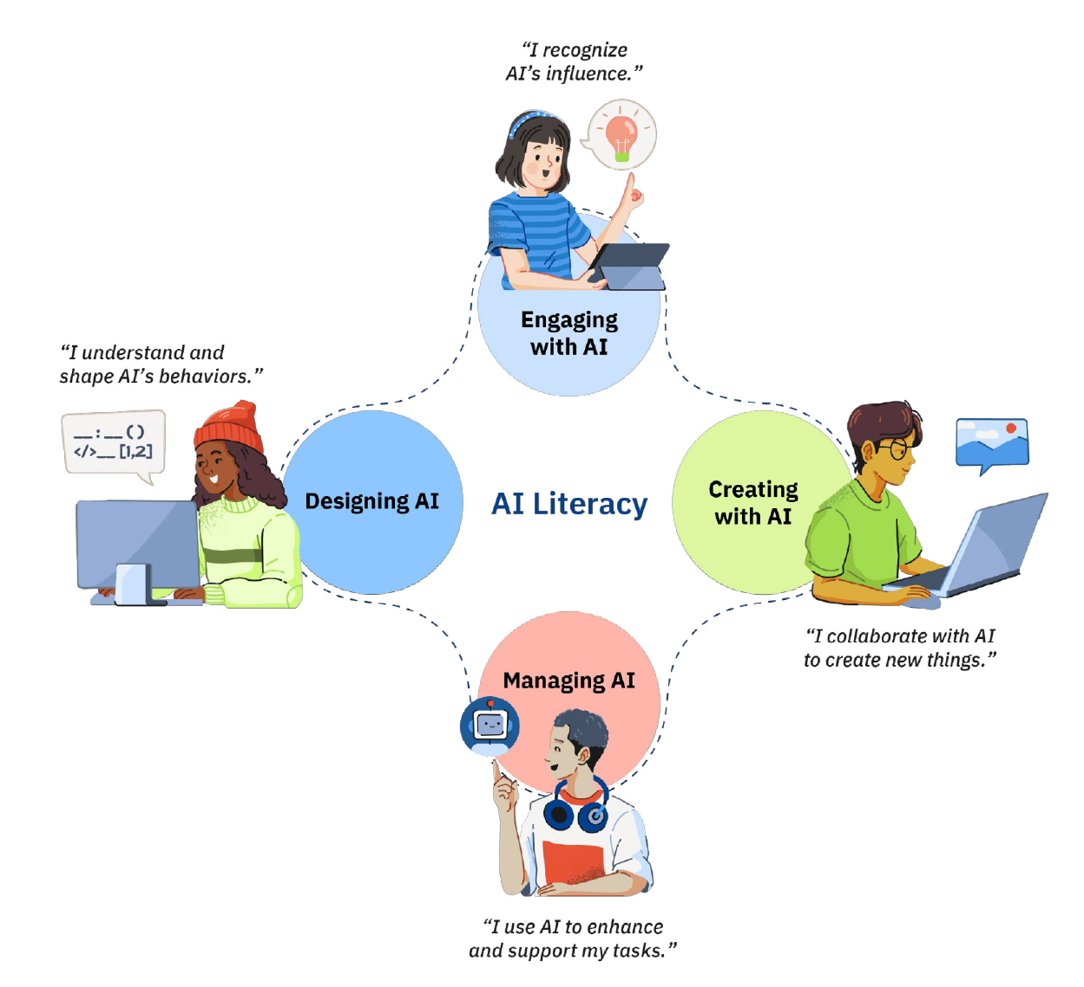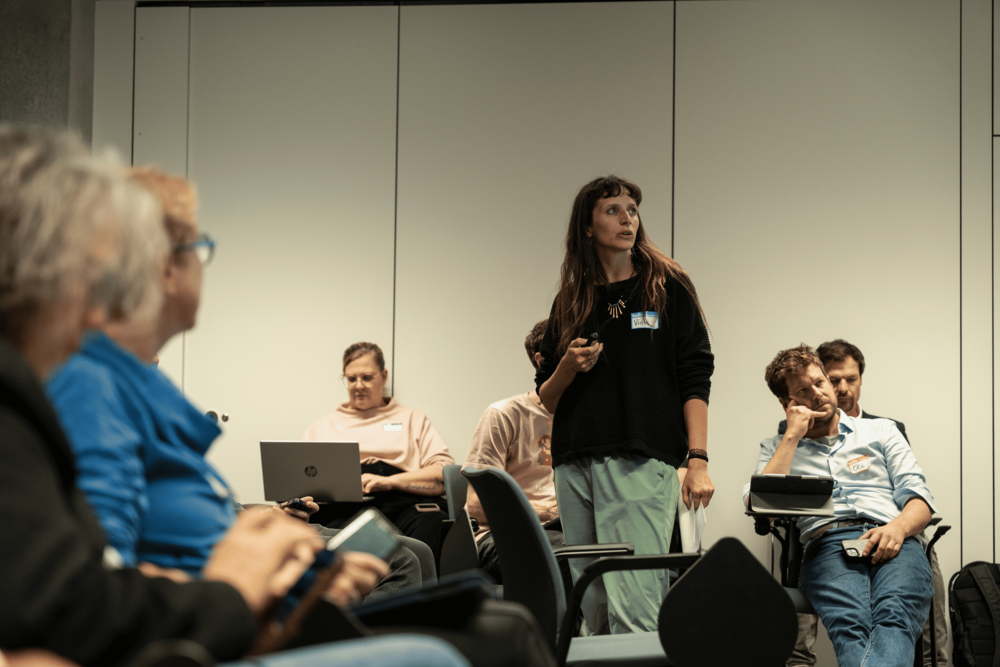AI literacy in schools: How AI competences become part of teaching


From voice assistants and chatbots to automatic image recognition – artificial intelligence is now part of pupils’ daily lives. But which competences do they need in order to deal with AI confidently and responsibly? The forthcoming AI Literacy Framework of the European Commission and the OECD offers guidance. A taskforce coordinated by the Stifterverband has actively contributed feedback to its development process.
An international guide for AI competences
The AI Literacy Framework of the European Commission and the Organisation for Economic Co-operation and Development (OECD) is a guide for AI competences in primary and secondary education. It was developed with support from Code.org as well as a group of international experts and was published in its first draft in May 2025.
Florian Rampelt, head of the AI Campus office and programme director for Future Skills & AI at the Stifterverband, is contributing as a German representative. This is creating an internationally coordinated reference framework, which, among other things, will feed directly into the PISA study, in which Media & AI Literacy will be surveyed for the first time in 2029.
AI Literacy is defined as follows: “AI literacy represents the technical knowledge, durable skills, and future-ready attitudes required to thrive in a world influenced by AI. It enables learners to engage, create with, manage, and design AI, while critically evaluating its benefits, risks, and ethical implications.”
The framework thus addresses key AI competences – ranging from technical understanding and critical reflection to creative and responsible action – and provides guidance for teachers, schools, and education policy on how these competences can be purposefully promoted in the classroom.
Based on an extensive feedback process, the final version of the Framework will be published in the first half of 2026. Individual competences and competence domains will still be adjusted.
Current competence domains of the AI Literacy Framework
In its current draft version, the framework describes four key competence domains that pupils need for a reflective engagement with AI: Engage with AI (recognising, assessing, and critically questioning AI in everyday life), Create with AI (using AI creatively and responsibly), Manage AI (deciding when AI should be used), and Design AI (understanding the basic principles of AI systems, designing and further developing AI systems). It connects the dimensions: knowledge, skills and attitudes and illustrates with scenarios how these competences can be fostered in an age-appropriate manner in primary and secondary education.
Graphic: Four key competence domains from the current draft version of the AI Literacy Framework
A practical example from the AI Literacy Framework comes from the domain Engage with AI: Pupils are to learn how AI systems make predictions and generate recommendations – for example, on social platforms or streaming services. In the secondary school scenario, learners examine how recommendation algorithms filter information and can potentially restrict perspectives, such as through filter bubbles or algorithmic bias.
The scenario links technical knowledge (how data patterns are recognised and processed) with critical reflection (which content becomes visible and which does not) and encourages a curious, reflective attitude towards AI. Teachers can integrate this activity directly into lessons by having pupils analyse examples, critically question their own recommendations, or carry out small experiments to visualise how algorithms work.
Impetus from the education community
To include the perspective of the German education community, the Stifterverband, with the support of the TÜV SÜD Foundation, set up a taskforce consisting of educational science, school practice, and educational organisations. The taskforce emerged from the Alliance for Teachers in the Future Mission Education initiative. Together, they developed extensive feedback on the Framework draft, which is now being incorporated into the international revision.
Photo: Tom Wiedemann / App Camps
Key questions and findings
In several discussion rounds, the Framework was analysed in detail. The focus was on questions regarding practical usefulness, areas for improvement, and potential barriers to implementing AI Literacy in schools and teaching.
It became clear:
- Teachers are key figures: They not only convey knowledge about AI, but also support pupils in interacting confidently with AI, critically reflecting on the use of the technology, and making ethical decisions.
- Practical relevance is essential: Easily accessible materials and professional development opportunities make it easier to transfer into everyday school life.
- AI Literacy as a cross-cutting issue: AI competences should be strengthened across subjects and linked with existing learning content – not treated as an isolated additional topic.
The relevance of practical transfer was also evident at the AI Summit for Teachers in early November in Berlin. In a workshop, participants considered how the competences of the AI Literacy Framework can be translated into concrete classroom scenarios.
Outlook: The pathway to educational practice
The AI Literacy Framework will be further developed until 2026. For Germany, this creates the opportunity to anchor the acquisition of AI competences early and systematically in schools, universities, and teacher education.
It is crucial that policy and educational institutions create the framework conditions so that teachers can specifically foster these competences. What AI Literacy means concretely in schools – and how pupils can be empowered to understand AI not just as a technical subject, but as a part of social responsibility – is a subject for ongoing dialogue.
Learning opportunities relating to AI Literacy in schools on the AI Campus
- Die Welt der KI entdecken (Technical University of Munich)
- School empowers with AI (Junge Tüftler)
- AI Explorables for Schools (IMAGINARY)
- Erste Schritte mit KI und Datenanalyse (Science on Stage)
On our topic page “AI in Schools”, student teachers and teachers will find many more suitable learning opportunities for addressing the topic of AI in the classroom.

Viola Geiger is a content and community manager at the AI Campus. She is responsible for the development of learning programmes and networking with a focus on ‘AI in schools’. She studied mathematics and art with a focus on teacher training at Heidelberg University of Education and Charles University in Prague. Her experience as a teacher and in adult education gives her a practice-orientated perspective on school and lifelong learning. Her focus is on creative, innovative learning methods and digital learning.

